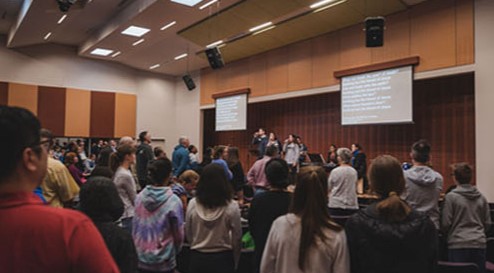AUDIO RECORDING

WRITTEN TRANSCRIPT
Appointing Helen Bell to our Ministry Team
Session in the coming budget will be seeking the congregation’s support for its decision to ask Helen Bell to join the ministry team in the role of Training Pastor.
There will be a range of responses to this initiative. For example, some of us on hearing this news will think ‘about time’ we appointed a qualified and competent woman to this kind of role on the team, others may be puzzled about the timing of the appointment in relation to the search for a new senior pastor, and still others, while knowing and respecting Helen, might be concerned that her appointment as Training Pastor might be a compromise of our complementarian understanding of the relationship of men and women, that is “the belief that God made men and women equal and distinctive: equal in value and dignity, and distinctive in certain responsibilities and roles.” [Beynon and Tooher Embracing Complementarianism p.9] They might be particularly concerned that it is a compromise of the injunction in 1 Tim. 2 where Paul writes that “I do not permit a woman to teach or to exercise authority over a man” [1 Timothy 2:12 ESV]. I have put a link to a wider discussion of Helen’s appointment, including a brief description of our understanding of complementarian ministry at Bundy, the job Description of the Training Pastor role, why we want to appoint Helen, and some FAQ’s about the appointment HERE. But in this talk I want to briefly address the last concern, the question of faithfulness to Scripture.
Faithfulness to Scripture
Faithfulness to Scripture is a precious thing. It is good to fear disobeying God for our life is found in trusting and obeying His word – we live by every word that proceeds from the mouth of God [Deut. 8:3]. I am also aware of the seduction of the world and the capacity to drift in our convictions on this matter where the cultural context seems to be flowing in the direction of obscuring differences and rejecting any distinction in roles. And I write as one who is conscious that those who teach will be more severely judged, and also as one who has had a long personal history of engagement with these issues and has sought in that engagement to uphold at all times the authority of Scripture.
My first debate on these issues was in the Presbytery of Wagga Wagga – either 1986 or 1987 – when as the youngest members of the Presbytery David Thurston and I were asked by the Presbytery to argue the case against the ordination of women to the ministry as the Presbytery was debating an overture presented to the NSW Assembly to stop ordaining women to the ministry, a pre-union practice that was then still allowed in the post-union church. As the only ones in the Presbytery committed to upholding the authority of 1 Timothy 2 and not allowing its teaching to be dismissed through rejection of Pauline authorship or through claiming features of the context severely limited its application it was an uncomfortable experience for young ministers. It seemed clear then that the passage in 1 Timothy 2, understood in the context of 1 Timothy and of the whole of Scripture’s teaching on men and women in creation and salvation, made the ordination of women to either the eldership or ministry of Presbyterian churches inappropriate.
Subsequent to that debate I have had many opportunities to consider the Scripture’s teaching on men and women and how that is expressed in our common life, and also how our commitment to the authority and sufficiency of Scripture is expressed in how we use the Scriptures in relation to this question [e.g. in the Peter Cameron heresy appeal to the NSW General Assembly 1993, or here in Melbourne in discussions with egalitarians]. Over that time I hope my understanding of the text has deepened as I have defended its authority, but I have never wavered in my conviction that Scripture forbids women to ‘teach and have authority over men’ and that its appropriate application today in the Presbyterian church is insisting that its elders, including its ordained teaching elders, should be men. I am glad to be in a denomination where our elders are men for I think that the honouring of God’s teaching on the relationship of men and women is for our good and the good of our society.
The helpfulness of ministry teams
But over this time my thinking has also continued to develop in relation to ministry and the kind of ministry we need if we are going to sustain healthy, gospel focused congregations. I am convinced that the goals of congregational ministry in our suburban context are best served by ministry teams distinct from the eldership. This probably seems obvious to most of you but, especially for Presbyterians, it has not been the historic pattern. But our common life at Bundy bears witness to the helpfulness of ministry teams, in our capacity to grow to a size where we can sustain children’s and youth ministries and an adequate administration in a context where the importance of discipling children in a society unfriendly to the gospel and the amount and complexity of compliance obligations is increasing. Teams help the spread of the gospel and our discipling of each other.
And over this time my convictions about what a commitment to complementarianism says about the composition of our teams has also grown and developed. When I came to Bundy my time at a Bible College [SMBC] that had for years been training women and men for gospel service overseas and here had convinced me of what is obvious – that all of us, women and men, should be using our gifts to make disciples, and that the Session should be encouraging all to be engaged in that work, that the issue was not what some particular people could not do in certain contexts but what we should all be doing – helping people hear about and come to trust and follow the Lord Jesus. That commitment should be reflected in our ministry team, in recognizing that appointing suitably gifted and godly women to appropriate roles as full and equal members of the team under the authority of the minister and Session, like all the members of the team who are not on Session, is not at odds with our complementarian convictions but a fuller expression of them. And the reason for this is the Genesis 2 reason. Blokes alone are not enough to do what God calls us to.
'We need each other for life and ministry.'
We need each other for life and ministry. The man needed help at Creation, and men need help now. There is no embarrassment in needing or providing help, it is just a recognition of the way we are made, and God Himself is said to help His people [Wenham comments on Genesis 2:18 “Elsewhere helper/help usually refers to divine assistance ( e.g. Ps. 10:14, 30:10, 54:4, 118:7)…. To help someone does not imply that the helper is stronger than the helped; simply that the latter’s strength is inadequate by itself (e.g. Josh 1:14, 10:4, 6; 1 Chron. 12:17, 19, 21, 22)]. The form of help will depend on the gifts and abilities of the individual woman, and the help Helen will provide relate to two noticeable areas where we could be doing better – training, of both growth group leaders and in evangelism, and the co-ordination and support of the ministry being done by so many women in our congregation.
I am grateful that Helen has indicated that she will accept Session’s offer, grateful for a number of reasons.
- Firstly, we need that help in training and supporting our women leaders, and the other tasks mentioned in the job description, and Helen is well qualified by training and experience to provide it.
- Secondly, we do need to model a commitment to complementarian ministry in our ministry team. It has to some extent been a missing piece of the jigsaw, and we also need to show that there is a role in congregational ministry teams for able women who train at tertiary level to equip themselves to share the gospel and make disciples. That is an expensive commitment, but our society, which is characterised by full participation of women in higher education and work, needs women as well as men who are trained to engage people with the gospel and teach all the Lord Jesus has taught.
- And thirdly I am grateful Helen has indicated she will join us because on the surface Presbyterians don’t have the most welcoming structure or culture for able women.
Our commitment to complementarianism is countercultural where the popular feminist narrative is one of equality as sameness. [It is not the whole feminist narrative [e.g. Louise Perry], but it is the one that seems to have grasped the mainstream imagination.] And we do have an all male eldership and reserve teaching our mixed congregations on a Sunday for our elders. But I think, and I hope we will see, that the clarity of that commitment will give freedom to all to use their gifts to the fullest in ways where, at every level, we are helping each other be disciples of Jesus who make disciples of Jesus in faithfulness to our common Lord and in trusting obedience to His good word. That is what our world needs.
I have not gone into the details here of the job description or some particular issues that might be raised [e.g. by the title of the role, or by Helen training men and women as Growth Group leaders]. These are dealt with in the paper mentioned above, and I will be preaching on how men and women relate to each other in the ministry of the gospel on Sundays 10th and 17th March, with a question time after the evening congregation on the 17th. I and the other elders are also open for a conversation about the appointment at any time.
But I hope all of us can be grateful to God that we have the opportunity to welcome Helen, a godly and gifted woman many of us know well, onto our ministry team, and will support the appointment with our prayers and our giving. Pray particularly that Helen, like all on the ministry team, will be sustained in wisdom, godliness and faithfulness, and be refreshed by her current break after her retirement from her years of ministry with AFES.
RECENT POSTS





